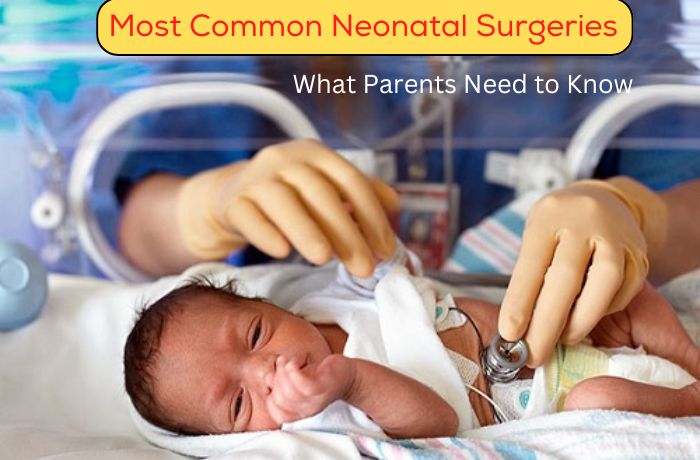
Welcoming a newborn is a moment of joy, but it can also present unforeseen challenges, especially when a baby requires surgery shortly after birth. For some parents, understanding the complexities of neonatal surgery is critical to navigating this difficult time. These procedures, which are performed within the first month of life, are essential to address congenital conditions and other early life complications. Gaining insight into these surgeries can help parents feel more prepared and confident that their newborn is receiving the best care. Understanding these common neonatal surgeries can help parents prepare and feel more comfortable.
What is Neonatal Surgery?
Neonatal surgery involves surgical procedures performed on newborns, usually within the first month of life. These surgeries address congenital (present at birth) conditions and other problems that arise early in life. Neonatal surgery is essential to saving lives and improving the long-term health of affected infants.
Common Neonatal Surgeries
1. Congenital Diaphragmatic Hernia Surgery
-What is it?
A congenital diaphragmatic hernia (CDH) occurs when there is a hole in the diaphragm, the muscle that helps you breathe. This hole allows organs such as the stomach and intestines to move into the chest, affecting lung development.
-Symptoms and diagnosis
Babies with CDH may have difficulty breathing after birth. They may also have a fast heart rate or look blue from lack of oxygen. Doctors diagnose CDH with prenatal ultrasounds or with chest X-rays after birth.
-Surgery and results
Surgery involves moving the organs back into place and closing the hole in the diaphragm. With advances in medical care, many babies recover well, although long-term follow-up is often necessary.
2. Esophageal Atresia and Tracheoesophageal Fistula Repair
-What are they?
Esophageal atresia occurs when a baby’s esophagus (the tube that carries food from the mouth to the stomach) doesn’t form properly. It may end in a pouch instead of connecting to the stomach. Tracheoesophageal fistula is a condition in which there is an abnormal connection between the esophagus and the trachea (windpipe).
-Pre- and post-surgical care
Before surgery, babies often need help breathing and feeding. Doctors may place a feeding tube and use a ventilator if needed. During surgery, the esophagus and trachea are separated and reattached correctly. After surgery, babies gradually learn to feed orally and require careful monitoring.
3. Gastroschisis and Omphalocele Repair
-What are they?
Gastroschisis is a condition in which the baby’s intestines stick out of the body through a hole near the belly button. An omphalocele is similar but occurs through the belly button and the organs are covered by a thin sac.
-Importance of early detection and treatment
These conditions are usually detected by prenatal ultrasound. Early detection allows surgery to be scheduled soon after birth, which is critical for the baby’s health.
-Surgery and recovery
The surgery pushes the bowel back into the abdomen and closes the hole. Recovery includes careful monitoring of the baby’s feeding, growth, and organ function.
4. Congenital Heart Defect Surgery
-Overview of common defects that require surgery
Some babies are born with congenital heart defects, such as holes in the heart or malformed heart valves. These defects can affect the baby’s blood flow and oxygen levels.
-Diagnosis and treatment options
Doctors use echocardiograms (ultrasounds of the heart) to diagnose these problems. Treatment varies depending on the defect but may include medications, catheter-based procedures, or open-heart surgery.
-Postoperative care and expected recovery
After surgery, babies require intensive care and monitoring. Follow-up visits with a pediatric cardiologist are essential to ensure that the heart is functioning properly.
What parents need to know
-Pre-surgery Preparation
Preparing for your baby’s surgery involves both physical and emotional readiness.
Prepare your baby: Follow your doctor’s instructions for feeding, medications, and other preoperative guidelines.
Questions to ask: Don’t hesitate to ask your pediatric surgeon about the procedure, risks, recovery time, and expected results.
-Post-surgery Care
After the surgery, your baby will need special care to recover.
Recovery process: Understand the typical recovery timeline and what to expect while in the hospital and at home.
Signs of Complications: Know the signs of potential complications, such as fever, infection at the surgical site, or difficulty breathing, and when to contact your doctor.
Dr. Apoorva Kulkarni, Pediatric Neonatal Surgeon in Thane
Meet Dr. Apoorva Kulkarni
Dr. Apoorva Kulkarni is a highly regarded pediatric neonatal surgeon in Thane. With extensive training and experience in neonatal surgery, Dr. Kulkarni has helped numerous newborns recover from complex surgical conditions.
Success stories and testimonials
Parents often praise Dr. Kulkarni for her compassionate care and surgical expertise. Many share their stories of how Dr. Kulkarni’s intervention has positively impacted their children’s lives.
Understanding common neonatal surgeries and knowing what to expect can help parents navigate this challenging time. With the right information and support, parents can ensure that their newborns receive the best care possible. If you are looking for an experienced pediatric neonatal surgeon, contact Dr. Apoorva Kulkarni in Thane for expert advice and treatment.
